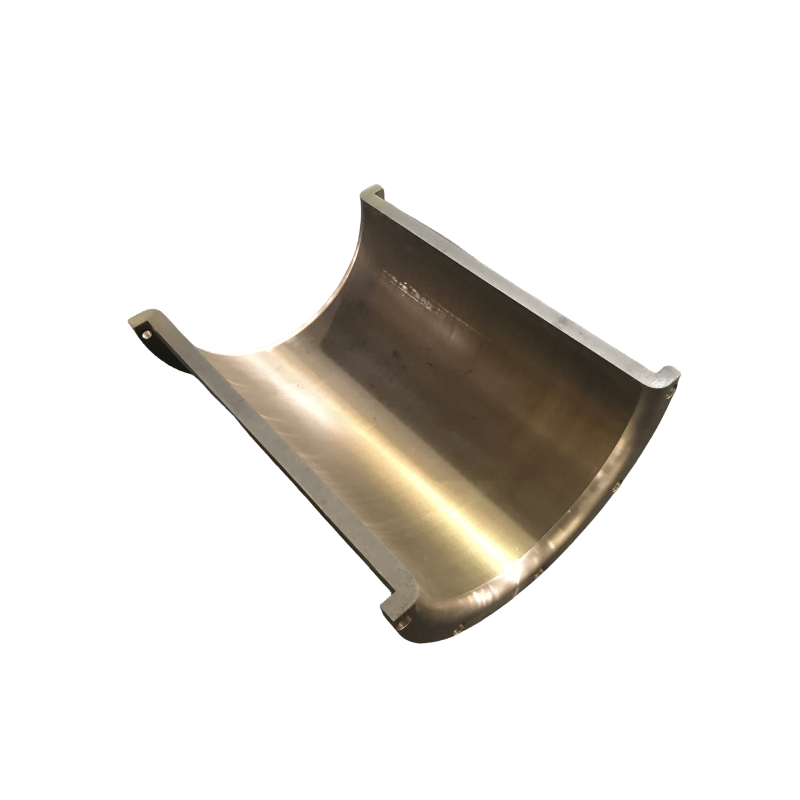
구리합금 베어링은 우수한 기계적 성질, 내식성, 내마모성으로 잘 알려진 다양한 산업 분야의 필수 부품입니다. 이 베어링은 기계, 자동차 시스템, 항공우주 및 기타 여러 분야에서 광범위하게 응용됩니다. 이 기사에서는 구리 합금 베어링의 다양한 응용 분야를 살펴보고 제조에 사용되는 가장 일반적인 등급 중 일부를 강조합니다.
구리합금 베어링의 이해
구리 합금 베어링은 일반적으로 주석, 알루미늄, 니켈 또는 아연과 같은 다른 금속과 구리를 결합하여 만들어집니다. 이 조합은 순수 구리의 특성을 향상시켜 향상된 강도, 내마모성 및 열 전도성을 나타내는 베어링을 만듭니다. 구리 합금의 고유한 특성으로 인해 성능과 수명이 중요한 특정 응용 분야에 이상적입니다.
구리 합금 베어링의 주요 특성
- 내식성: 구리 합금, 특히 알루미늄이나 니켈을 함유한 합금은 내부식성이 뛰어나 열악한 환경에서도 사용하기에 적합합니다.
- 내마모성: 구리 합금의 경도와 강도는 베어링이 연속적인 움직임과 하중을 받는 응용 분야에서 마모를 줄이는 데 도움이 됩니다.
- 열 전도성: 구리 합금은 열전도율이 뛰어나 고성능 응용 분야에서 중요한 효율적인 방열이 가능합니다.
- 가공성: 많은 구리 합금은 쉽게 가공할 수 있으므로 제조업체는 정확하고 복잡한 베어링 설계를 만들 수 있습니다.
- 낮은 마찰: 동합금 베어링은 낮은 마찰계수를 나타내는 경우가 많아 원활한 작동을 촉진하고 기계의 에너지 소비를 줄입니다.
동합금 베어링의 응용
1. 자동차 산업
자동차 부문에서 구리 합금 베어링은 내구성과 내마모성으로 인해 다양한 부품에 일반적으로 사용됩니다. 응용 분야는 다음과 같습니다.
- 엔진 베어링: 커넥팅 로드 및 메인 베어링에 사용되는 동합금 베어링은 높은 하중과 온도에서도 안정적인 지지력을 제공하여 엔진 전체 성능에 기여합니다.
- 변속기 베어링: 자동 및 수동 변속기에 구리합금 베어링을 적용하여 부드러운 기어 변속과 지속적인 응력하에서 긴 수명을 보장합니다.
2. 항공우주 산업
항공우주 산업은 극한의 조건을 견딜 수 있는 부품을 요구합니다. 구리 합금 베어링은 다음 분야에 사용됩니다.
- 랜딩기어: 랜딩 기어 어셈블리의 베어링은 상당한 응력과 마모를 견뎌야 합니다. 구리 합금은 필요한 강도와 내식성을 제공합니다.
- 엔진 구성 요소: 제트 엔진의 베어링은 열적 및 기계적 특성을 위해 구리 합금을 사용하는 경우가 많아 까다로운 환경에서도 안정적인 작동을 보장합니다.
3. 산업기계
산업 기계에서 구리 합금 베어링은 효율성을 높이고 유지 관리 비용을 줄이는 데 중요한 역할을 합니다. 응용 분야는 다음과 같습니다.
- 슬리퍼: 구리 합금 베어링은 부식 및 마모에 대한 저항이 신뢰성과 긴 수명을 보장하는 펌프에 일반적으로 사용됩니다.
- 압축기: 압축기의 베어링은 구리합금의 낮은 마찰력과 열전도율을 활용하여 효율적인 작동과 수명을 보장합니다.
4. 해양 애플리케이션
뛰어난 내식성을 고려하여 구리 합금 베어링은 해양 응용 분야에 자주 사용됩니다.
- 프로펠러 샤프트: 프로펠러 샤프트의 베어링은 바닷물 및 기타 가혹한 조건에 노출됩니다. 구리 합금은 기능을 유지하고 마모를 줄이는 데 도움이 됩니다.
- 갑판 기계: 구리합금 베어링은 내구성이 필수인 윈치, 캡스턴 등 각종 갑판 기계에 활용됩니다.
5. 건설장비
베어링이 무거운 하중과 가혹한 조건을 견뎌야 하는 건설 기계에서 구리 합금 베어링은 다음 용도로 사용됩니다.
- 굴삭기 및 로더: 동합금 베어링은 중장비의 움직이는 부품에 필요한 강도와 내마모성을 제공합니다.
- 유압 시스템: 유압펌프 및 액츄에이터의 베어링은 구리합금의 내식성과 열적 특성을 활용합니다.
구리 합금 베어링의 일반적인 등급
여러 등급의 구리 합금이 베어링 제조에 일반적으로 사용되며 각각은 서로 다른 응용 분야에 적합한 특정 특성을 갖습니다. 가장 널리 사용되는 등급은 다음과 같습니다.
1. C93200 (SAE 660)
- 구상화 소둔 및 연화 처리: 주로 구리(약 83%), 주석(6~7%), 납(7~8%)으로 구성되며 기타 원소도 미량입니다.
- 속성: 내마모성이 우수하고, 가공성 및 내하중성이 우수합니다. 이 등급은 자동차 및 산업 기계 베어링을 포함한 견고한 응용 분야에 자주 사용됩니다.
- 애플리케이션: 자동차 엔진 및 변속기 베어링은 물론 다양한 산업 분야에 흔히 사용됩니다.
2. C93700 (SAE 841)
- 구상화 소둔 및 연화 처리: 구리(약 90%), 주석(6~7%), 소량의 납 및 기타 원소로 구성됩니다.
- 속성: 높은 내마모성과 우수한 강도를 제공하며 특히 진동 또는 회전 운동과 관련된 용도에 적합합니다.
- 애플리케이션: 펌프베어링, 선박용, 범용 산업용 베어링에 사용됩니다.
3. C95400 (SAE 660)
- 구상화 소둔 및 연화 처리: 구리(약 85%), 주석(6~8%), 알루미늄(5~7%)이 함유되어 있습니다.
- 속성: 강도, 내마모성이 우수하고 가공성이 우수합니다. 알루미늄을 추가하면 고부하 응용 분야에서 성능이 향상됩니다.
- 애플리케이션: 자동차 및 항공우주 부품을 포함한 중장비 및 고성능 응용 분야에 일반적으로 사용됩니다.
4. C92500(SAE 797)
- 구상화 소둔 및 연화 처리: 주로 구리(약 90%)이며 주석과 니켈이 소량 포함되어 있습니다.
- 속성: 강도가 높고 내식성이 우수하여 까다로운 환경에 적합합니다.
- 애플리케이션: 해양 및 산업 기계와 같이 가혹한 조건에 대한 내구성과 저항이 요구되는 응용 분야에 사용됩니다.
결론
구리 합금 베어링은 강도, 내식성 및 내마모성을 모두 갖춘 다양한 산업 분야의 필수 구성 요소입니다. 다양한 응용 분야는 성능과 신뢰성이 중요한 자동차 및 항공우주에서부터 산업 기계 및 해양 시스템에 이르기까지 다양합니다. C93200, C93700, C95400 및 C92500과 같은 일반적인 구리 합금 등급은 특정 요구 사항에 맞는 맞춤형 솔루션을 제공하여 제조업체가 현대 엔지니어링의 과제를 해결할 수 있도록 보장합니다.
산업이 지속적으로 혁신하고 발전함에 따라 고성능 베어링에 대한 수요는 계속 증가할 것입니다. 입증된 실적과 고유한 특성을 갖춘 구리 합금 베어링은 설계에서 안정적이고 효율적인 솔루션을 찾는 엔지니어와 제조업체에게 필수적인 선택으로 남을 것입니다.
